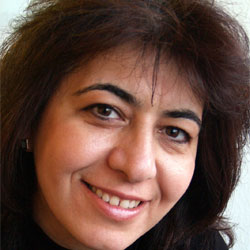How magnificent the war is!
How eager
and efficient!
Early in the morning,
it wakes up the sirens
and dispatches ambulances
to various places,
swings corpses through the air,
rolls stretchers to the wounded,
summons rain
from the eyes of mothers,
digs into the earth
dislodging many things
from under the ruins …
Some are lifeless and glistening,
others are pale and still throbbing …
It produces the most questions
in the minds of children,
entertains the gods
by shooting fireworks and missiles
into the sky,
sows mines in the fields
and reaps punctures and blisters,
urges families to emigrate,
stands beside the clergymen
as they curse the devil
(poor devil, he remains
with one hand in the searing fire) …
The war continues working, day and night.
It inspires tyrants
to deliver long speeches,
awards medals to generals
and themes to poets.
It contributes to the industry
of artificial limbs,
provides foods for flies,
adds pages to the history books,
achieves equality
between killer and killed,
teaches lovers to write letters,
accustoms young women to waiting,
fills the newspapers
with articles and pictures,
builds new houses
for the orphans,
invigorates the coffin makers,
gives grave diggers
a pat on the back
and paints a smile on the leader’s face.
The war works with unparalleled diligence!
Yet no one gives it
a word of praise.
Notes on the Poem
This week’s poem is excerpted from the 2006 Griffin Poetry Prize-shortlisted collection, The War Works Hard by Elizabeth Winslow translated from the Arabic written by Dunya Mikhail. Of the collection, the judges, said; “These are political poems without political rhetoric, Arabic poems without Arabic poetical flourishes, an exile’s letter with neither nostalgia nor self-pity, an excavation of the ruins of her homeland where the Sumerian goddess Inana is followed on the next page by the little American devil Lynndie England. In Elizabeth Winslow’s perfect translations, poetry takes on its ancient function of restoring meaning to the language. Here is the war in Iraq in English without a single lie.” Listen to Dunya Mikhail read in this 92Y reading. Catch Dunya Mikhail in conversation with Ani Gjika at our second Translation Talks event on March 10, 2022 at 7pm ET. Register here.
